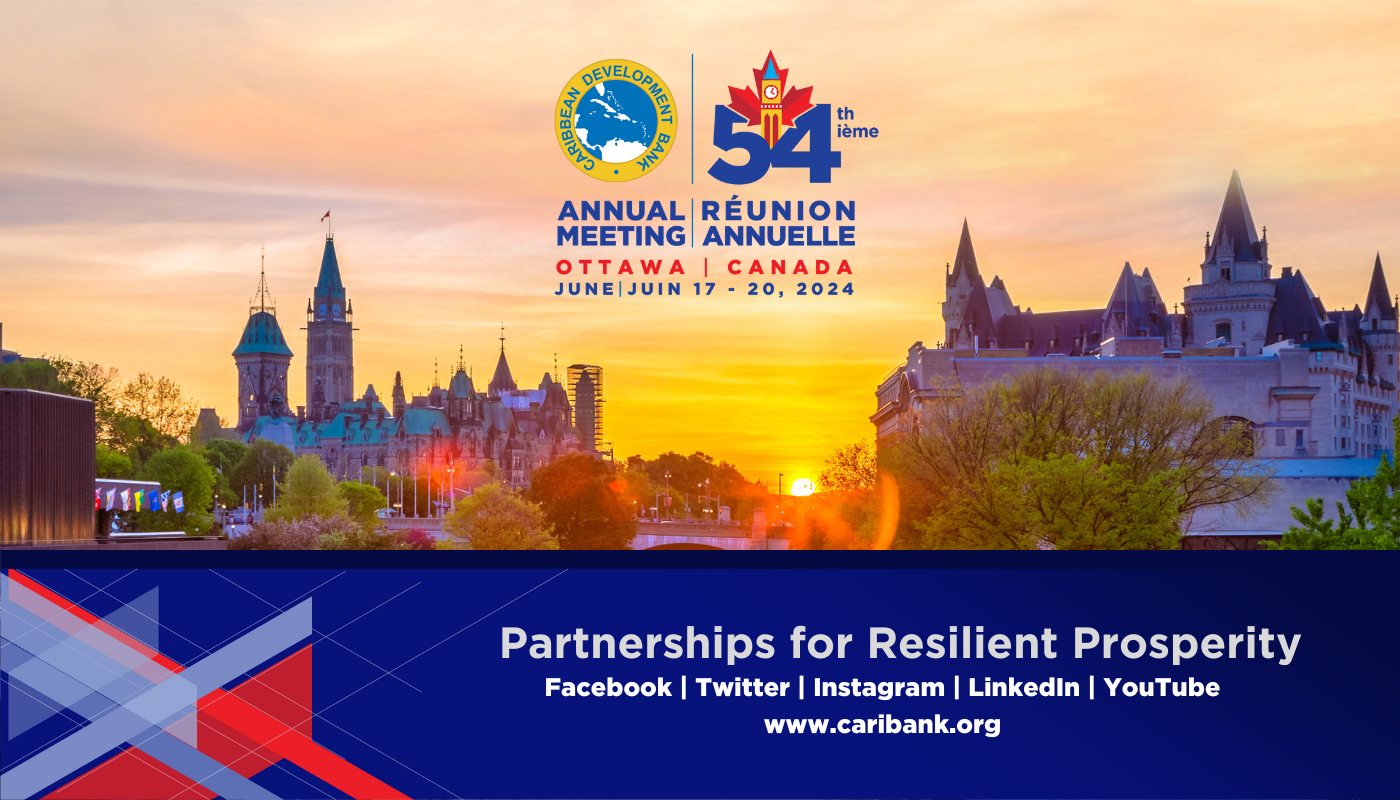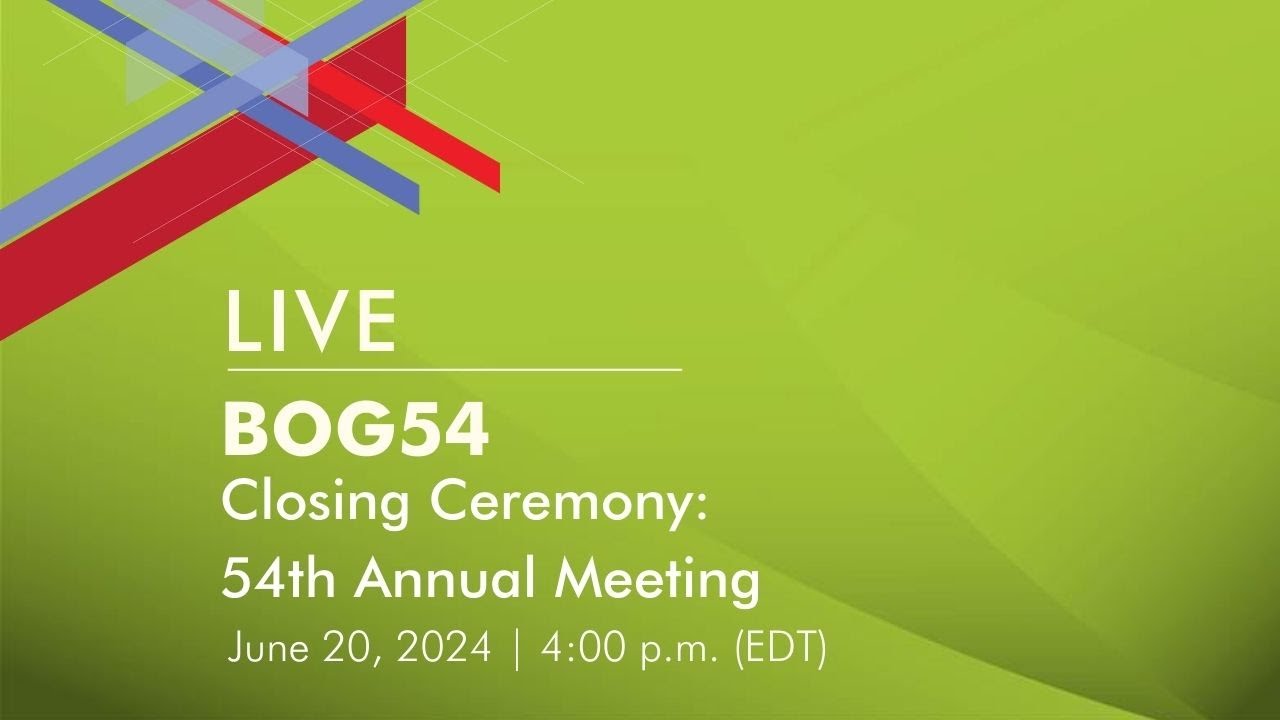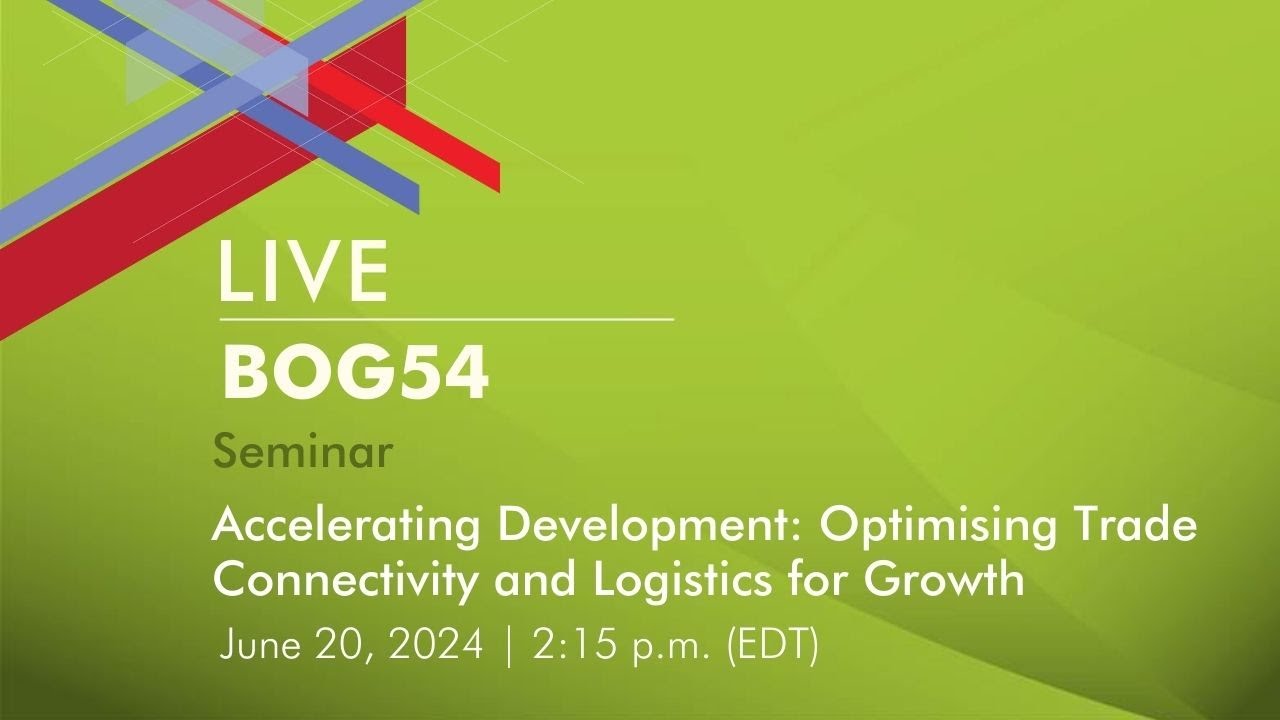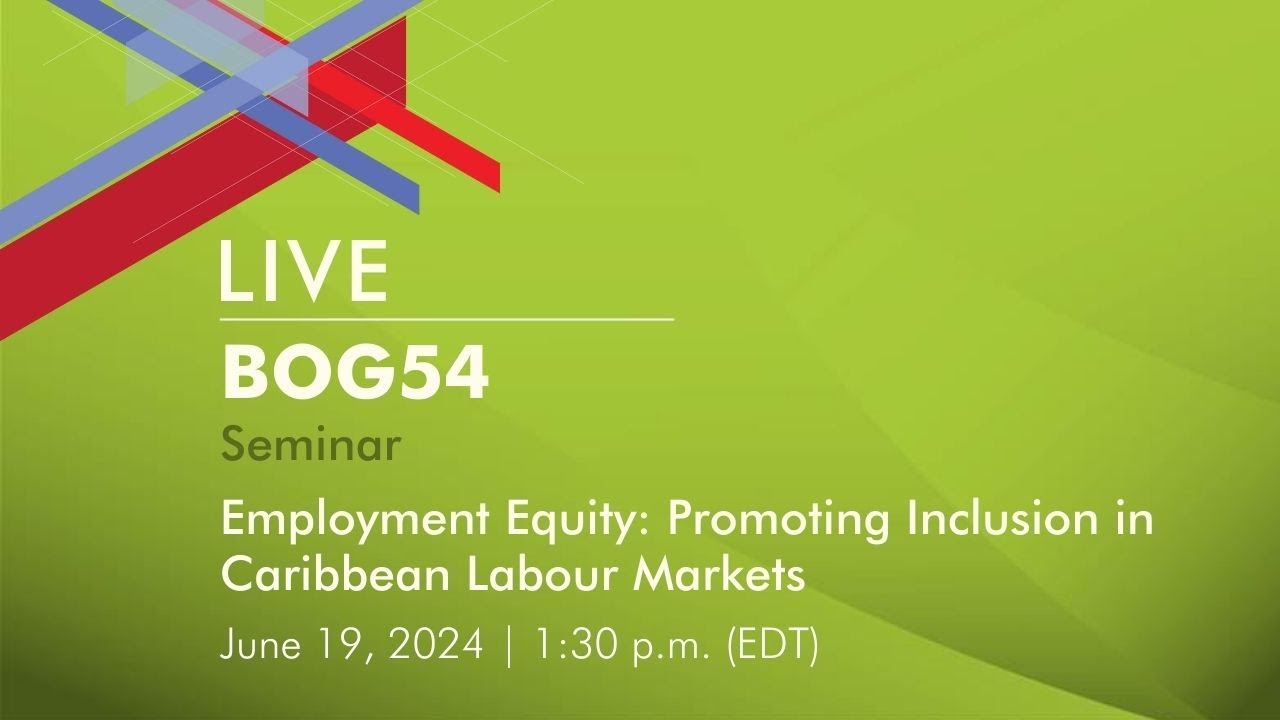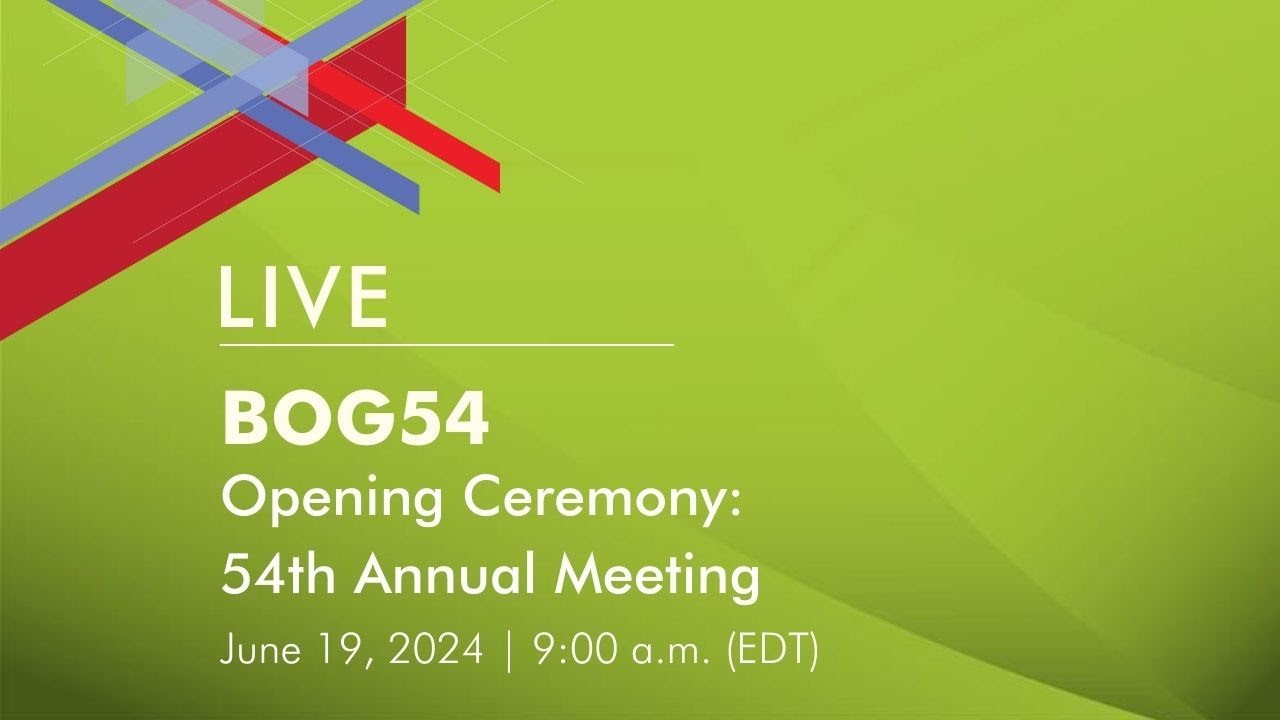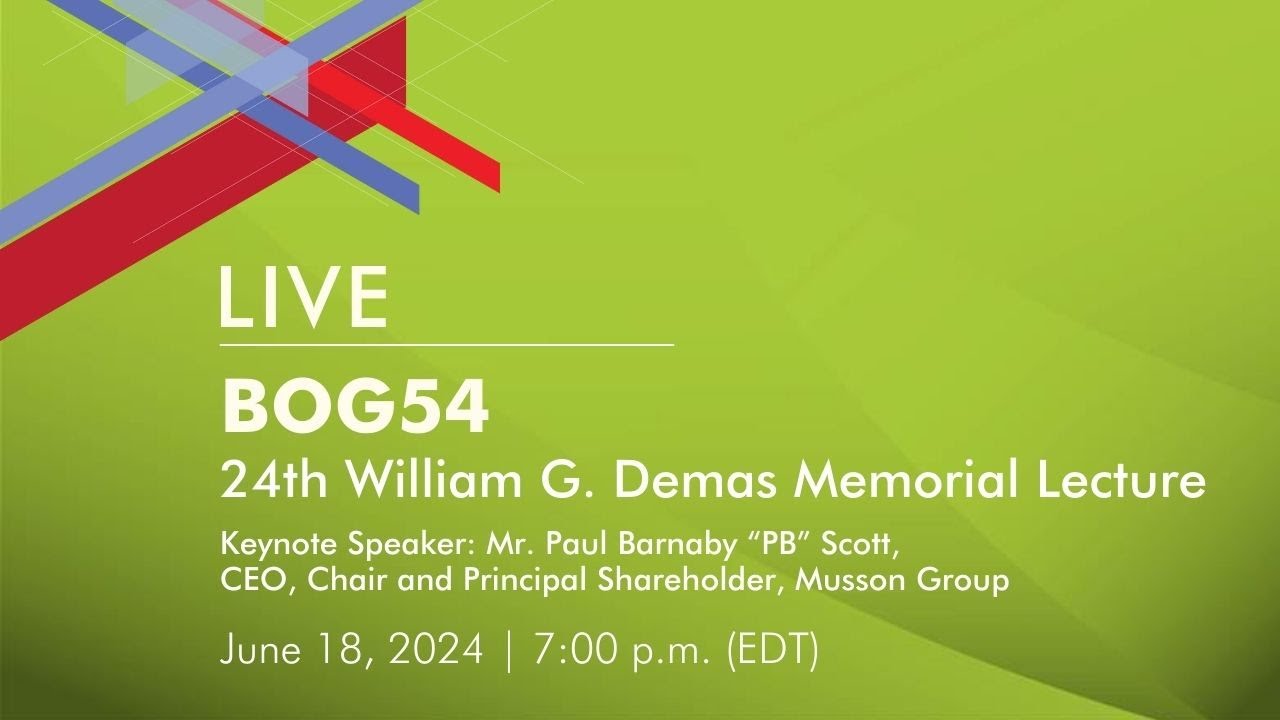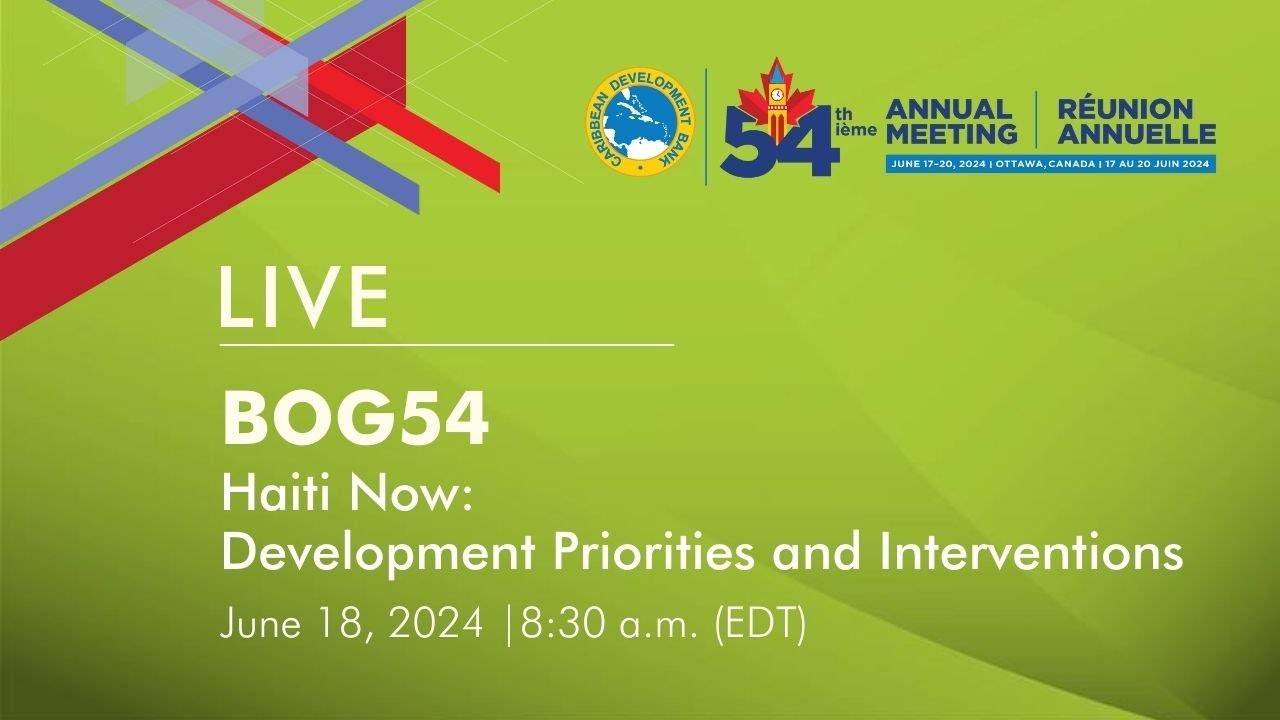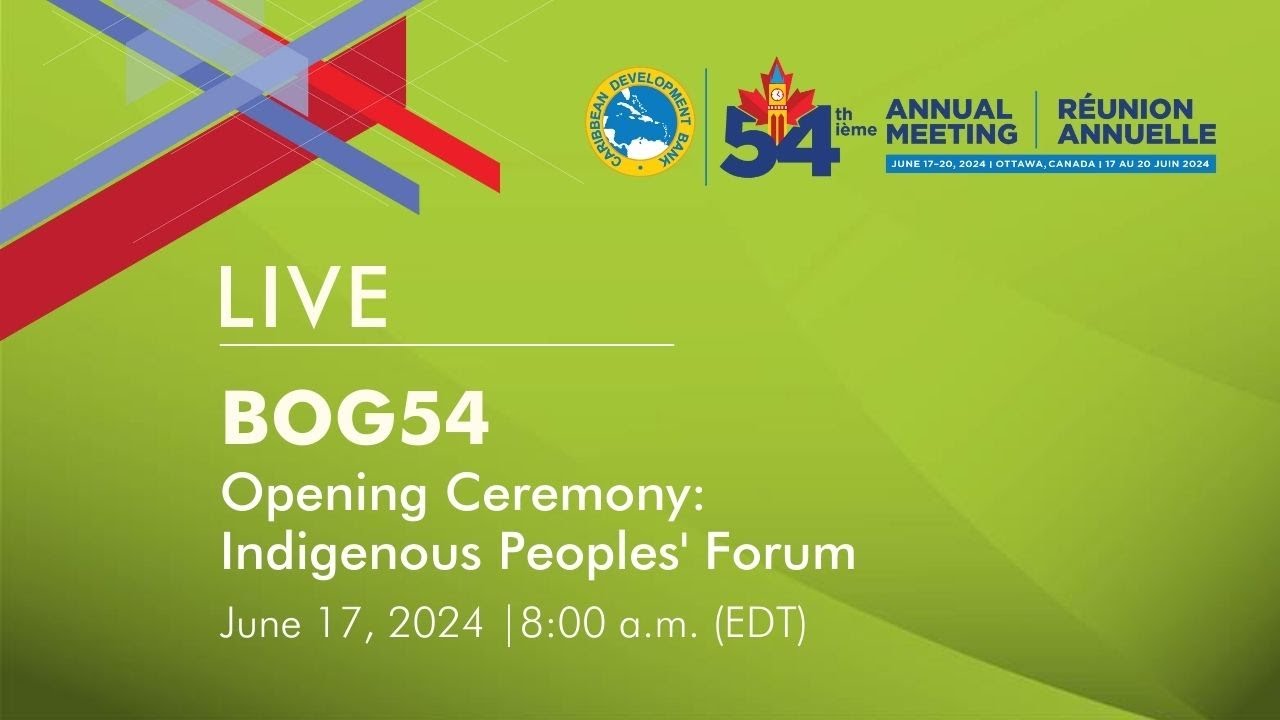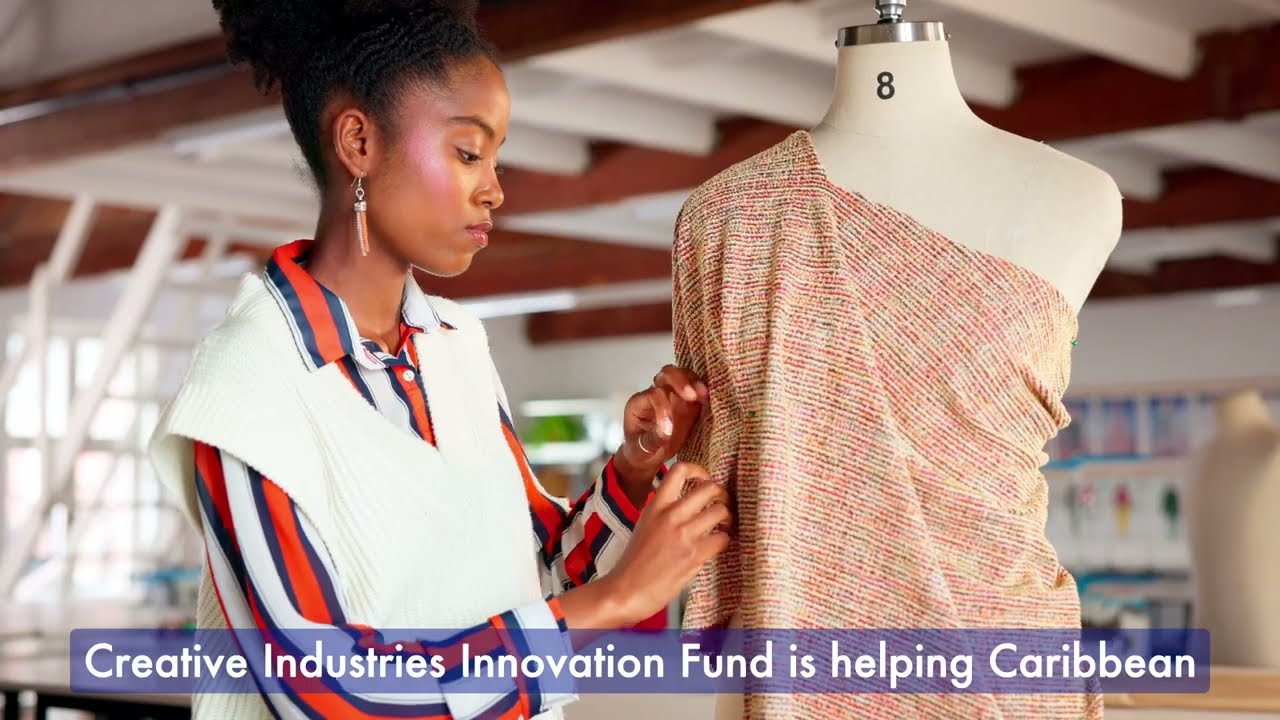Thank you so much!
It’s wonderful to be here in Ottawa.
Thank you to the team who has worked so hard to make this day a reality, including putting together that wonderful video.
2,400 miles…that’s the distance between where we are gathered here today and the headquarters of the Caribbean Development Bank in Barbados.
But today I can’t feel much of any distance at all. I see so many familiar faces from our beloved Region.
I especially want to recognise the Premier of Montserrat, Hon. Joseph Farrell, and the Deputy Prime Minister of St. Kitts and Nevis, Hon. Dr. Geoffery Hanley, distinguished members of the CDB Board of Directors, Board of Governors, – and, of course, our Chair, Hon. Ahmed Hussen, for being with us.
Canada is a true partner to us, and we thank you for hosting our Annual Meeting for the third time, and for welcoming us with such hospitality.
I look forward to strengthening our ties with you as we continue to chart a course for the future.
This year’s meeting has the perfect theme for our current moment – Partnerships… for Resilient… Prosperity.
Indeed, we know that the challenges we face are too complex and too large for any single organisation, government, or community to solve alone. No institution on its own can achieve the tasks we have ahead.
It will take all of us – working together as one. We must work together to share knowledge, exchange ideas, and mobilise sorely needed resources.
That’s why we continue as one to boost our partnerships with key organisations acting on a multilateral basis – that includes the Inter-American Development Bank, Green Climate Fund, Global Partnership for Education, and many others.
And that’s why I’m privileged to be here with so many thought leaders, innovators, academics, business leaders, indigenous groups from the Caribbean and Canada, policymakers, elected officials, and others so committed to the continued prosperity and development of the region.
…we are blessed with so many incredible resources, so much natural beauty in our corner of the world. So many people think of the Caribbean and think of words like – Carnival… Holiday... Paradise.
That’s especially true during those LONG Ottawa WINTERS.
But we know there’s so much more when you look closer.
What makes the Caribbean so special is our people – people driven by dreams, ambition, and potential.
We may be a collection of relatively small nations, but we're a great Region too.
In fact, the key reason we are able to be a great Region is due to our resilience AND our ability to compete globally with our knowledge and intellectual dexterity.
As a boy growing up in the Caribbean, I have come to appreciate and acknowledge the institutions that have shaped who we are as a people. The institutions that are indelibly knitted into the fabric of what it looked like to be Caribbean. As youngsters we were inspired by the exploits and all conquering nature of our West Indies Cricket team. The titans nurtured and developed by the University of the West Indies. And of course the roads, the schools, our saviour in times of disaster, the Caribbean Development Bank. We can ill afford for these pillars to become vestiges of our past.
CDB plays a pivotal role in funding critical infrastructure projects, supporting economic and social development, and eradicating poverty across the region – and is the region’s best friend in times of disaster.
Yet, it is only with the steadfast support of all of us, TOGETHER, that we can ensure that these pillars not only endure but also lead us towards a brighter, more prosperous future.
Ladies and Gentlemen, each step of the way, our success has been built on partnerships. Together – working with local communities, governments, financial institutions, businesses and entrepreneurs – we are driving change across our borrowing member countries.
There is so much that we can do with the accumulated brainpower in this room and in the region to drive development…build greater resilience…and prioritise shared, broad-based prosperity that benefits the people and communities in the Caribbean.
Reflecting on Success
I’m pleased to report that we have seen incredible momentum in meeting our vision of collaborating to build stronger Caribbean economies and societies.
The Caribbean region has seen remarkable developments highlighted recently during key international fora.
For example, the Global Supply Chain Forum spotlighted the Caribbean's innovative strides in digital transformation within logistics and supply management, significantly enhancing intra-regional trade efficiency and integration into global markets.
This reflects the Caribbean's proactive and forward-thinking approach to sustainable development, and global economic integration.
CDB’s Contribution
In 2023, the Caribbean Development Bank approved over $400 million in financing across diverse sectors, including water, renewable energy, education, health, and social protection.
And in keeping with this meeting’s theme… this substantial investment was made possible through our strategic partnerships with Canada, the Inter-American Development Bank, the European Investment Bank, the European Commission, and the United Kingdom’s Caribbean Infrastructure Partnership Fund.
The year saw so many accomplishments we can take pride in. I’d like to take a moment to highlight a few:
In times of distress, our efforts in providing budgetary support have proven instrumental in restoring public trust and helping governments to steady the ship. We allocated $150 million to The Bahamas and $43 million to Saint Lucia, enabling these nations to navigate financial challenges with resilience and fortitude.
A cornerstone of our mission is poverty reduction, and our flagship Basic Needs Trust Fund stands as a testament to this commitment. With close to 100 projects underway, representing a $30 million investment, we are making tangible differences in the Region’s poorest communities…
…whether it was the opening of the Caribbean’s first state-of-the-art therapeutic centre at the Maxfield Park Children’s Home in Jamaica providing comprehensive support and healing for victims of child abuse...
…or our Youth Economy Project in Saint Lucia, investing $6 million in young entrepreneurs and giving young people a pathway to a better future that rejects the choices of street violence and other anti-social behaviours.
Gender equality remains a vital priority. In partnership with the International Trade Centre, we launched the SheTrades Caribbean Hub, creating opportunities for women entrepreneurs to thrive. As the chair of the Multilateral Development Bank Working Group on Gender Equality, we proudly amplify the Caribbean’s voice on the international stage.
Our dedication to infrastructure development saw landmark projects – from the George Price Highway in Belize to the Linden to Mabura Hill Road Upgrade in Guyana. Think of the multiple positive impacts that a well-executed road project can have – helping workers commute on time, increasing school attendance, and reducing transit costs.
There is also the Port Modernisation project in Saint Vincent and the Grenadines that will improve the efficiency of cargo port services and support national development.
We are also advancing the Region’s transition to sustainable energy with initiatives like the Grid Interconnection and Renewable Energy Scaling project, aiming to lower electricity costs and reduce greenhouse gases.
In the social arena, we are addressing gender-based violence through the establishment of One-Stop Centres in Saint Lucia and St. Vincent and the Grenadines, in collaboration with UN Women. These centres provide a holistic response to survivors, ensuring they receive comprehensive support.
I’m proud of how far we have come – even as we acknowledge the long path before us. We must remain vigilant in addressing the challenges that lie ahead, such as high inflation, geopolitical tensions, and the ever-present threat of climate change. Our response to these challenges must be comprehensive and forward-thinking.
To ensure higher and sustained levels of economic growth, we need to focus on several key areas:
- Developing climate-resilient social and economic infrastructure.
- Improving institutional frameworks through digitalisation and the rise of generative artificial intelligence – after all, we can’t allow for a continuation of the “digital divide” between rich and poor, that has plagued us.
- Enhancing our pool of human capital by reducing skill-gaps and developing career pathways.
- Creating an environment that will strengthen energy security and stabilise costs.
- And improving logistics to boost intra-regional trade and food security.
Across all these challenges, I come to the same conclusion: none of us can do it alone.
As we move forward, we recognise that making the necessary investments to achieve resilient prosperity will require greater access to adequate and affordable financing.
And that’s why we’re committed to strengthening our partnerships – to mobilise the resources we need so critically, to tackle our biggest problems at scale.
A Call to Leadership and Collaboration
Take just one example: the climate crisis demands urgent attention. As we gather here, we know that the window is narrowing for us to take action on meeting the targets laid out in the UN’s Sustainable Development Goals.
The stakes could not be higher. We know that we can’t prevent or even necessarily plan for every great shock that we may experience.
What we CAN do is strengthen our foundation – and strengthen our resilience and capacity to withstand future shocks.
Now is the time to help our member countries build climate-resilient pathways. It may be painful to act now – but the pain will be far greater in the future, consequent upon inaction.
And we can’t delude ourselves: climate change is not a crisis to confront in some distant future.
It’s in the here and now! And the Caribbean is on the front lines!
We don’t have any time to waste.
To build environmental resilience, we will continue to support Climate Action through steps like our Climate Change Project Preparation Fund. This Fund will assist our Borrowing Member Countries in identifying and preparing climate change adaptation and mitigation projects. By providing the necessary resources and expertise, we aim to empower our members to take more proactive steps towards a more resilient future.
And in promoting energy security, through our sustainable energy framework, we assist members in establishing regulatory and governance systems to attract more sustainable energy investment, while reducing dependence on fossil fuels.
Finally – on the topic of addressing the needs of the most vulnerable, I must highlight our work in Haiti, the most populous country we serve and a nation that remains fragile and requires special attention from the Bank.
In Education, we are actively supporting the Government's national education plan by preparing two new projects. In ongoing vocational training efforts, we are equipping four technical institutes and will be training over 700 women to enhance their employability and entrepreneurial skills.
In addition, two days ago, our Board of Directors approved a special 5 million grant to help Haiti deliver electricity via three mini-grids to rural customers.
While CDB is mobilising resources to meet critical development needs, we recognise the challenges governments face with project implementation.
This year, we are conducting rigorous analysis to identify the root causes of implementation issues in the Region.
To build in-country capacity, we will provide "hands-on" support to improve procurement processes and leverage our upgraded digital systems to enhance project monitoring and reporting.
Each step of the way, the Board of Governors has played a crucial role in setting priorities, sharing insights, and holding us accountable.
In the days ahead, I look forward to discussing with you how we can take this collaboration to the next level, including in our roundtable discussion on the future direction of the Bank.
Envisioning the Next Decade
We’ll be taking a look together this week at a few crucial questions…
What does our next decade look like?
Where can we be most relevant? Where can we move the needle in the most meaningful way possible? How can we ensure impact through the 2020s and into the 2030s?
This organisation began in 1969, when challenges like digital literacy and Generative AI, let alone climate change, weren’t on the development agenda.
But we have continued to endure over the decades, as an institution, not because of any single individual but because of our capacity to reinvent ourselves…and adapt with the times, while staying resolute in our mission and focus.
Over the days ahead, I look forward to exploring with all of you what we see for the coming decade…and how we can apply innovation and new ideas to meet the Region’s demands for infrastructure, finance, connectivity, and evolving technologies.
Conclusion
It is important to remember that this development work is about putting the right conditions in place – the conditions that will enable us as a people to achieve our full potential, realise a better quality of life, and build a secure future for our children.
As stated in the video at the beginning, the future may hold uncertainties, but we are evolving to meet them. Our commitment to steering the Region through any challenge remains steadfast. Caribbean citizens and communities can trust in our proven capacity to navigate whatever may come.
Together, we will create a Caribbean that stands strong against climate change, boasts world-class infrastructure, and eradicates poverty. We stand with the people of our Region, united in building a future brimming with resilient prosperity.
I can’t wait to see what the next 10 years holds – and we can’t wait to build that future TOGETHER. Thank you very much.
